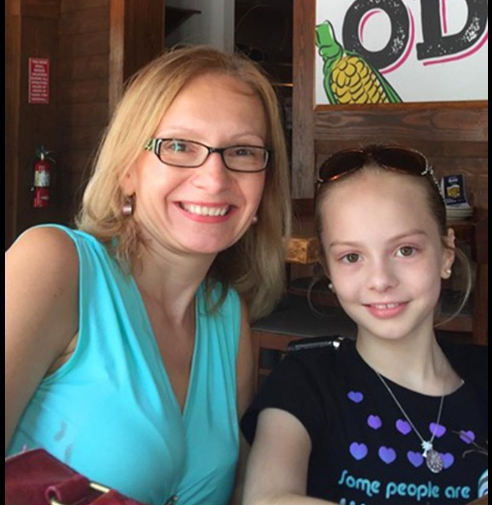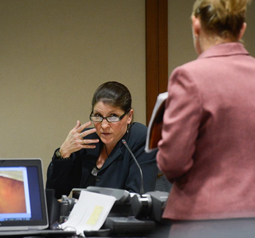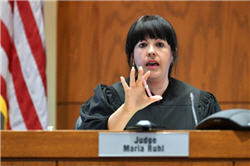SARASOTA — Maya Kowalski’s only problem when she entered Johns Hopkins All Children’s Hospital was a severe stomachache.
By the time the preteen left the St. Petersburg facility three months later, her condition had deteriorated, her family was shattered and her mother was dead.
Under the lead of Dr. Sally Smith, the hospital accused Maya’s mother of a
The ordeal illustrates the power that doctors and hospitals have to strip children from their families based on allegations of child abuse and how the state defers to their judgment.
Desperate to end her daughter’s confinement and devastated by their separation, Beata Kowalski, a registered nurse and immigrant from Communist-era Poland, took her own life in January 2017.
Days later, the state dropped its case and the hospital let Maya go home.
The surviving members of the Kowalski family are now suing All Children’s and Smith, a pediatrician and part-time medical director of the Pinellas County Child Protection Team. “They’ve showed absolutely no remorse. It’s as evil as you get,” said Greg Anderson, an attorney representing the Kowalski family.
Johns Hopkins All Children’s Hospital declined to comment on the allegations, citing privacy laws and ongoing litigation.
In an interview Friday, Smith said she couldn’t address the claims in the case, but defended her 30-year track record as a child abuse investigator.
“I am extremely thorough and do extremely comprehensive evaluations in cases that I’m involved with, both in my general pediatric practice as well as in the field of child abuse pediatrics,” she said.
In court filings, attorneys for the hospital contend that staff had good reason to suspect that Maya was a victim of Munchausen syndrome by proxy, a mental illness in which a caretaker, often a mother, fakes their child’s illness for sympathy and attention and had a legal requirement to report it.
But Maya’s father, Jack Kowalski, a 57-year-old retired deputy fire chief, says he is confident his case will prove Smith and her colleagues knew they were making a false child abuse report and stuck to it despite mounting evidence they were wrong.
The lawsuit also accuses Smith, the hospital and others of a host of wrongdoings, including medical malpractice, holding Maya against her will, dismissing the advice of her pediatricians, ignoring signs that her mother was on the verge of a breakdown and forbidding Maya access to her rosary and prayer documents.
The family is also suing the Department of Children and Families for records related to the case. A spokeswoman declined to comment due to the ongoing litigation.
“It seemed like they didn’t want to listen to what we were trying to tell them,” said Jack Kowalski after a hearing Tuesday at the courthouse in Sarasota, where the family filed its lawsuit. “We told them Maya’s story and they took the story and went off different roads with it.”
‘We know better than this pushy mom’
Maya’s symptoms began after the family moved from Chicago to Venice in 2014: Asthma attacks that turned into muscle weakness; weakness that led to burning sensations.
A diagnosis eluded doctor after doctor, leaving the family desperate and confused.
“If you’re a parent hearing your child crying 24/7 in bed and there’s nothing you can do for them,” Maya’s father said, “there’s nothing worse than that.”
It wasn’t until Dr. Anthony Kirkpatrick evaluated Maya that the family got an answer. The Tampa anesthesiologist believed the girl, then 9, suffered from a rare disorder called Complex Regional Pain Syndrome,
Even staff at All Children’s Hospital accepted the diagnosis in March 2016 — seven months before the family’s life-altering ordeal — when they implanted a port so Maya could receive intravenous treatments for her condition.
Yet the disorder has its detractors. Doctors still don’t know what causes CRPS, and a few believe it may be psychosomatic.
The Kowalskis embarked on a number of doctor-recommended treatments, from water therapy to oxygen chambers. Monthly infusions of a powerful anesthetic called ketamine seemed to work best.
Buoyed by the results, the Kowalskis sold their second home and flew to Mexico for the most expensive and controversial treatment yet — a ketamine-induced coma.
But Maya continued to relapse, spending days at a time curled in a fetal position. It was on one of those days in October 2016 that the family drove to All Children’s.
There, doctors began to doubt Maya’s condition — and her mother’s mental health. Hospital staff submitted an abuse report, but child welfare officials closed it the same day after confirming Maya’s CRPS with her specialist, court documents show.
The next day, hospital staff called Smith for a consultation and filed a second abuse report with more specific claims. It alleged Beata wanted to put Maya in a coma, that she became angry when Maya asked for food and that Maya wasn’t really in pain, court documents state.
“She was an advocate for her daughter,” said attorney Jennifer Anderson, who is also representing the Kowalskis. “And my sense is it struck these ER doctors that we know better than this pushy mom who’s coming in here telling us how to do our job.”
The allegations stunned Maya’s previous doctors.
Dr. John Wassenaar, one of Maya’s pediatricians, defended the family in a subsequent affidavit. He described her relationship with her mother as “open and remarkably frank,” adding that the decisions made by Smith and the hospital’s pediatric team caused “irreparable harm and injury.”
“It is irreparable in that Beata killed herself,” Wassenaar said. “It is irreparable in that Maya will always have a fear of inappropriate care and pain caused by her doctors.”
‘I’ve never seen her that frail’
As a go-to expert for the Department of Children and Families and its nonprofit contractors, Smith routinely dispenses medical opinions on suspected child abuse cases. Some of her conclusions have been controversial.
In 2014, Smith testified that the head injuries on an infant boy in Pasco County were inflicted by his father. But Florida’s Second District Court of Appeal overturned the removal, saying Smith’s conclusions were based “primarily on her assessment of the father’s credibility, not on the available medical reports.” The ruling also pointed to significant inconsistencies in Smith’s medical notes.
Smith also provided expert opinion in at least three “shaken baby syndrome” cases filed between 2009 and 2012 blaming the caregivers.
In one case, the caregiver was found not guilty. In another, the judge dropped the charges after the defendant passed a lie detector test. The third, involving a former Palm Harbor day care owner, is currently on appeal, with the Innocence Project of Florida backing the defendant.
Smith, however, said these outcomes are the exception rather than the rule.
“There are all kinds of factors that go into prosecuting cases and juries’ determination of guilt and innocence,” she said. “I’ve been doing this for 30 years and I’ve had to my knowledge maybe two or three cases that there’s been some sort of appeal process.”
In their lawsuit, the Kowalskis accuse Smith of exaggerating Beata’s behavior to justify a diagnosis of Munchausen syndrome by proxy — also known as factitious disorder.
Smith, by her own account, has diagnosed between 10 to 20 cases of Munchausen in her career, according to court documents. She says that’s not excessive.
The disorder is reported in fewer than 2 cases per 100,000 children, according to the authors of a 2013 study published in the official journal of the American Academy of Pediatrics.
“Although fabricated illness in a child is relatively rare,” the report’s authors wrote, “best estimates suggest that health professionals will likely encounter at least one case during their career.”
“If you’re a doctor and you even run across one in your entire career, it’s unusual,” said the family’s attorney Jennifer Anderson. “Ten to 20? Something’s up.”
Dr. Marc Feldman, a Munchausen syndrome expert and author of the book “Dying to be Ill: True Stories of Medical Deception,” said it’s plausible that an established child abuse expert could have run across that many cases.
Investigators who suspect Munchausen, Feldman said, should recruit an authority to spot its telltale signs: bouts of illness that begin while the mother is alone with the child; mysterious ailments among other members of the family; and miraculous improvements once the child is separated from the mother.
Feldman said he would have expected Maya to show improvement during her lengthy hospitalization if Munchausen was to blame.
“I would want to have seen some evidence for improvement sooner,” he said. “Three and a half months is a long time.”
But Maya kept getting worse.
“When she came out of that hospital, I swear, if you set her up she would fall over, she was so weak,” Jack Kowalski said. “She couldn’t get into her bed, get out of bed, nothing. It was a long, long journey. I’ve never seen her that frail.”
‘Please take care of Maya’
Maya, now 13, sits at the plaintiffs’ table at the Sarasota courthouse — frail and pale but in remission — waiting patiently to seek justice.
The seventh-grader, elegant and poised for her age, has been practicing with attorneys for the day she must testify.
But when asked about her ordeal, it triggers a raw, almost physical breakdown. Her face crumples. Her shoulders collapse. Her delicate frame trembles. And she cries so hard that she can’t speak.
“I just remember [my dad] had to go and I was so crestfallen and disheartened by the fact that I was just sitting there alone,” an emotional Maya told the Herald-Tribune. “And all I could do was stare at the clock and watch the time go on.”
Early in her stay, staff placed Maya in a room with surveillance equipment so they could record her every movement, the lawsuit states. Once that was over, the weeks passed in a blur of painful physical therapy, psychotherapy and tears.
Thanksgiving passed. Her 11th birthday. Christmas. And always, there was the pain.
Maya began to believe that she would never get out.
Meanwhile, her mother began to fray under the stress. Even as her husband regained some of his visiting privileges, officials refused to clear Beata. She spent sleepless nights worrying about her daughter’s treatment and days begging for Maya to be transferred to another hospital.
She fainted in a courtroom. Her marriage began to falter.
Beata feared that her daughter was dying.
She begged 12th Circuit Senior Judge Lee Haworth to end the separation at a January 2017 hearing. Haworth refused, based on the advice of Smith and All Children’s Hospital. He also denied her request to hug Maya, who was in the courthouse building meeting with a psychologist.
Less than 48 hours later, Beata killed herself.
She told her family she had a migraine and couldn’t attend a neighbor’s birthday party that night. She encouraged them to go without her.
Then Beata typed two suicide notes — one to her family; the other to Haworth — and hanged herself with a canvas strap from the garage door frame. Her brother found her the next morning. Attached to her left arm was an intravenous line connected to an empty plastic bag labeled sodium chloride.
She was 43.
In the notes, she told her children she loved them and blamed the hospital, the doctors and the courts for her suicide.
“Please take care of Maya but don’t make her suffer anymore. She doesn’t deserve that,” Beata wrote. “No child deserves that!”
Less than a week later, Haworth reversed course and returned Maya to her father, noting in his decision that she and her mother “had a very close and loving relationship.”
He acknowledged that on the recommendation of the hospital, the court had deprived her of “meaningful educational opportunities, holiday celebrations, free communication with friends and relatives, and frequent access to the comforts offered by her Catholic religion.”
“She now needs to grieve with the support of family and friends,” he wrote.
The next month, independent court-appointed psychologist Dr. Tashawna Duncan released her final report, disagreeing with Smith’s diagnosis of Munchausen syndrome by proxy. She noted that at least two other mental health professionals were also unable to confirm the diagnosis.
The Department of Children and Families moved to close the case that same day.
‘If I sink, we all sink’
Neighbors in the small lakeside community where the Kowalskis had hoped to retire waved banners and cheered as Jack Kowalski wheeled his daughter down the street.
In his affidavit, Wassenaar, Maya’s pediatrician, observed that Maya was even more frail, even more in pain, and “even more depressed, anxious and of course, grief-stricken” than ever.
Jack Kowalski has encouraged Maya and her 11-year-old brother, Kyle, to stay strong.
With Maya walking again and the kids back in school, a semblance of normality has returned to the family. They swap funny stories about their mother almost every day. They also talk openly about the lawsuit, in which both Maya and Kyle are named.
As for Jack Kowalski, he hasn’t given himself as much time to grieve — or think about anything other than the case. “If I sink, we all sink,” he said.
Given the complexity of the case, it will likely be late 2020 until the matter comes to trial. Kowalski said he’s ready.
“We already lost Beata,” he said. “We gotta do this for everybody else.”
|
Timeline Dec. 10, 2005: Maya Kowalski is born in Elmhurst, Illinois. July 2015: Maya suffers from a severe asthma attack and is admitted to Johns Hopkins All Children’s Hospital. She starts exhibiting severe muscle weakness. September 2015: Tampa anesthesiologist Dr. Anthony Kirkpatrick diagnoses Maya with Complex Regional Pain Syndrome (CRPS). Maya embarks on different kinds of treatments, including infusions of the powerful anesthetic ketamine. March 2016: All Children’s Hospital evaluates Maya and agrees to implant a port to facilitate her ketamine treatments. May 2016: An All Children’s Hospital pulmonologist notes significant improvement in Maya’s condition and pain levels due to her treatments. Oct. 7, 2016: Maya gets a severe stomachache. Maya’s father, Jack Kowalski, takes her to All Children’s Hospital. Her mother, Beata, arrives later and tries to explain Maya’s condition and ketamine treatment plan to staff. Suspicious staff call in a report of “medical neglect” to the child abuse hotline claiming Beata may have mental issues. The same day, Department of Children and Families investigators reach out to Maya’s doctor to confirm her CRPS and close the case. Oct. 8, 2016: Hospital workers call St. Petersburg pediatrician and child abuse expert Dr. Sally Smith for advice. After her consultation, a second abuse report is called in with more specific details, such as claims that Maya was not really in pain and that Beata was angry at Maya for stating that she felt good. Oct. 11, 2016: Smith calls Kirkpatrick, Maya’s doctor, to discuss her CRPS diagnosis. He notes down that Smith appears highly focused on Munchausen syndrome by proxy. Oct. 13, 2016: Maya is placed in protective custody. Her parents are told that they cannot see her. Dec. 29, 2016: At a court hearing, parties report that no inpatient facilities within the state are willing to accept a child as medically complex as Maya. Jan. 6, 2017: Beata requests to be able to see Maya and give her a hug, but is denied. The judge concludes that Maya should stay at the hospital pending an upcoming trial. It has been three months since Beata has seen Maya. Jan. 7, 2017: Beata dies by suicide. She is 43. Jan. 13, 2017: Maya is ordered released back to her family by the judge, who notes in his decision that it is contrary to the hospital’s medical advice but in the best interest of Maya, in his opinion. Feb. 1, 2017: Independent psychiatrist Dr. Tashawna Duncan’s psychological evaluation of Maya and her family is filed with the court. Duncan concludes that she has no evidence Beata faked Maya’s condition for psychological purposes. The same day, DCF moves to close the case. April 20, 2017: DCF’s request to close the case is granted. Oct. 5, 2018: The Kowalski family files a lawsuit against the hospital, Smith and Suncoast Center. |
|
|


 bizarre form of child abuse. The allegation triggered a court-ordered separation that isolated Maya from her family and sent the mother into frenzied despair.
bizarre form of child abuse. The allegation triggered a court-ordered separation that isolated Maya from her family and sent the mother into frenzied despair. which impairs the central nervous system and heightens pain sensations. Two other doctors later came to the same conclusion.
which impairs the central nervous system and heightens pain sensations. Two other doctors later came to the same conclusion.